Despite what may be the popular belief, B2B Telemarketing is still very much in use. Although there are more sales tactics on the market than ever, the B2B space still heavily relies on making personal relationships because of its small and specific audience size.
Read on to find what companies are using B2B Telemarketing for, why it is still the pillar of B2B sales and what the traits of successful B2B Telemarketers are.
What is B2B Telemarketing
Simply put, B2B Telemarketing is a method used in B2B sales. Companies that are selling a product are reaching out to potential customers, i.e. businesses, via telephone. The calls are performed by business development representatives whose goal is usually to schedule a business meeting where their company’s product or services will be discussed.
B2B Telemarketing can be performed by an in-house team, or an agency such as an outbound call center can be hired to manage this part of business.
What B2B Telemarketing can be used for
B2B Telemarketing can be used to achieve several goals – not only direct sales. Telemarketing agencies can be contracted to perform several types of work that can benefit a business. Although B2B Telemarketing falls under the sales department, it can also be used for marketing activities.
Here are some activities that B2B Telemarketing can be used in.
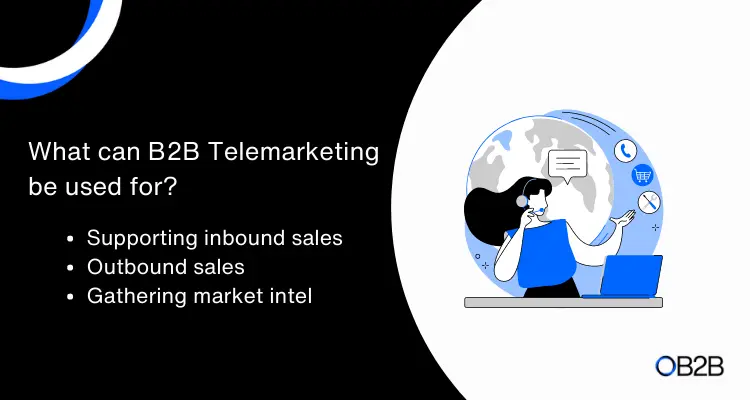
Supporting inbound sales
If a company has established inbound marketing and sales, it could be getting tons of leads. However, in B2B sales all these leads usually have to be processed in order to go further down the sales funnel or out of it. In other words, B2B Telemarketing can be used to filter through a long list of potential prospects. By calling them, B2B Telemarketers can establish if the lead matches the buyer persona or if it should be dismissed.
It may not seem as much, but as we will explain further down the line, B2B sales is all about creating and maintaining personal relationships. Furthermore, a company may not be able to segment its audience right away and may need additional intel to narrow down its pool of prospects.
Outbound sales
Outbound sales differs from its inbound version in an important detail: the leads you are contacting did not already have a touchpoint with a company that can be referred upon. In inbound marketing and sales process, a prospect will visit a company’s blog or download an eBook, so B2B Telemarketers will have a reference to mention during their intro call. Also, they will know what this person is interested in.
On the other hand, outbound sales take longer. It takes more time, research and a lot of unanswered calls. It is an exhausting process, but as mentioned, B2B sales does not have the luxury of a wide audience. Therefore, B2B Telemarketing is used to not only filter through a lengthy list of leads, but also to identify right opportunities.
Gathering market intel
Even before a business is established, it might be useful to feel out the market. If a business plans to delve into a B2B area, it might be useful to gather intel first. For example, if a company plans to develop an accounting software, it can find out what accountants are looking for by employing B2B Telemarketing.
Moreover, this technique can be used if a company plans to change direction product-wise, or if marketing and sales need to refresh their tactics and buyer personas.
Is B2B Telemarketing still effective?
Nowadays, we are all aware of the many sales and marketing channels out there. The internet has opened a myriad of opportunities for businesses to present, market and sell their products or services. In that kind of environment, B2B Telemarketing cannot possibly stand well, can it?
Well, the surprising truth is that B2B Telemarketing is still very effective. This is because B2B sales is very different from B2C. Businesses with customer-oriented products are reaching for a larger audience, and sales can easily be realized in multiple channels and within a few easy steps.
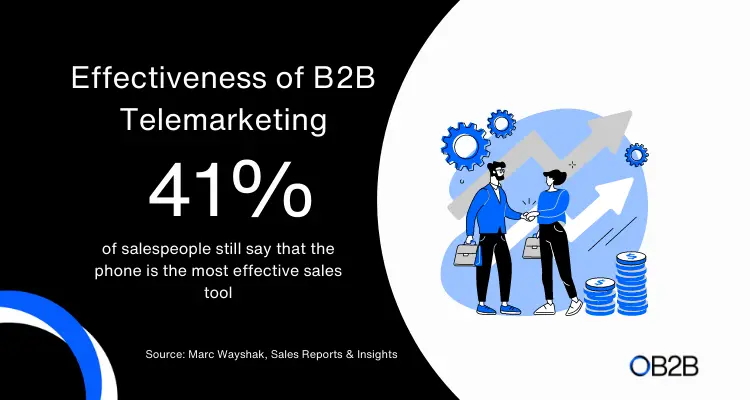
However, there is an emphasis on relationships in B2B sales. The audience is much smaller, so there is less room for mistakes on the sales side. Also, it makes sense to target buyers personally – with B2B Telemarketing. Since the pool is smaller, getting in direct contact with a buyer persona will largely increase the chance of a sale.
Moreover, B2B companies want to secure long-term relationships with their customers to pay off their investment, which usually comes with an annual deal renewal. Moreover, sales outsourcing has made it possible for companies to hire experts in B2B sales while maximizing their efficiency.
Differences in B2C and B2B Telemarketing
As we are all consumers of B2C sales on a daily basis, it may be hard to visualize how B2B marketing and sales processes differ from it. In this section, you will find out which aspects of marketing and sales in B2B and B2C are based on completely different perspectives.
Here are the main differences between B2B and B2C from a sales and marketing point of view.
Relationships with customers
A B2C company producing soft drinks will use multiple channels to present their drink to their vast audience. The next step is simple: each audience member will either buy or not buy the drink. A sales process is short and consists of only a few steps. In B2C, the goal of marketing is to establish transactional relationships with its customers.
B2B Telemarketing aims to develop a relationship with its customers. A lot more personal care and attention is put into nurturing leads. If a prospect is not answering emails, a business development representative will pick up the phone and ask if everything is alright. This relationship-centered outlook on customers is only natural, since B2B sales are much more complex than B2C and the personal relationship is the social glue that helps the sales process along.
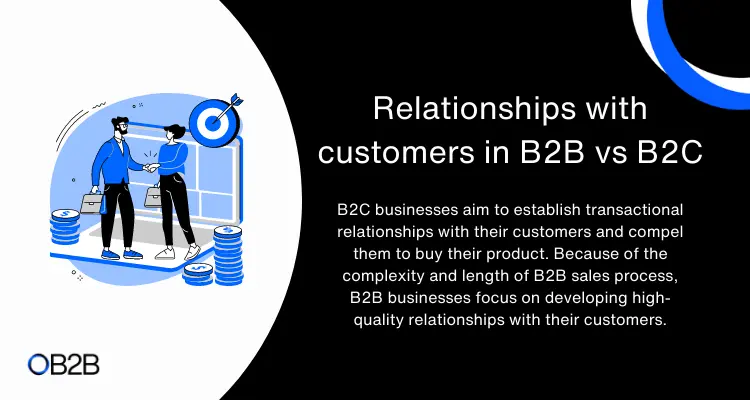
Brand
Since they are reaching a large audience, B2C marketers have to catch a lot of people’s attention fast to make a simple decision: to buy their product. This is why messaging is a priority for B2C marketing. After all, we all know the examples of the most successful B2C brands out there and their inviting slogans.
On the other hand, B2B branding is once again focusing on relationships with customers. B2B Telemarketing’s goal is to put all attention on prospects, the issues they face, the solutions they want to see. This is why those kinds of messages are being portrayed to position B2B companies in the market.
Sales process
Simply put, the B2C sales process is very simple. Unless customers are determined to buy your product, they will usually compare it with your competitors. Therefore, their buyers’ decision-making process is very straightforward.
In contrast, the B2B sales process is highly complex. During the B2B telemarketing process, business development representatives will establish personal relationships with prospects. As potential buyers, prospects often keep salesmen in the loop with the decision making that is taking place within the company. Since the decision to buy a certain product has to be made by various people in multiple departments, it makes the B2B sales process longer and more complex than its B2C counterpart. And it is exactly the reason that B2B Telemarketing is still its most important sales channel.
Audience
B2C companies’ audiences are usually much larger than B2B’s ones. B2C businesses operate in a large scale market that has its own logic: capturing attention with emotional ads, writing a compelling copy and creating easy buying experiences.
At the same time, the B2B audience is very specific. It usually consists of professionals in a certain field. Marketers try to capture their attention by writing in-depth content and present themselves as industry experts to get their trust and attention. As explained earlier, in the early days, B2B Telemarketing can even be used to gather more info on the main characteristics of their audience and potential buyers.
Advertisement
In B2C uses simple language to evoke a emotional response in its buyers. Ever heard of “Taste the feeling” from Coca Cola or “Das Auto” from Volkswagen? These two are epitomes of compelling, simple, and emotion-evoking ad copies.
On the other side, B2B marketing ads often rely on using the professional language to convey the message of having the expertise. After that, a B2B Telemarketing phase follows, where business development representatives are trying to establish trust on a more personal level.
Traits of successful B2B Telemarketers
Since B2B Telemarketing is essential to B2B companies, you should know which characteristics and skills to look for in business development representatives you want to hire as your callers. For start, you should be looking for ambitious individuals that see sales as their passion: this will ensure that they stay motivated and hungry to make yet another call or sale.
In B2B Telemarketing, it really pays off to have the following skills.
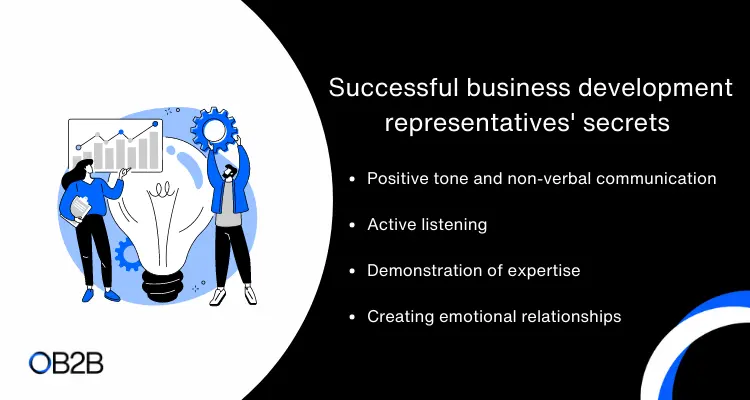
Tone and non-verbal communication
In B2B Telemarketing, business development representatives rely on their over-the-phone skills 100%. In that sense, every little thing, such as tone, counts.
B2B Telemarketers aim to have a calm, but positive tone of voice. After all, they are trying to capture their prospects’ attention by imposing on their time – and usually, their prospects are very busy.
You might think that non-verbal communication is not important for talking over the phone. On the contrary! Tone of voice depends on the person’s posture, and people can actually detect if you have a smile on your face over the phone. In that sense, B2B Telemarketing relies on the art of effective communication in more ways than you would think.
Listening
People usually think that successful salesmen’ most important skill is persuasive talk. However, listening is much more important. In fact, people find persuasive salesmen invasive and are more commonly repelled by their tactics.
However, it also does not take a degree in psychology to be a successful salesman as some might think. What it really takes is a simple human touch! Active listening is a tactic long used in B2B Telemarketing.
Active listening is easy to understand but takes a bit longer to perfect. It involves reflecting on prospects’ words, paraphrasing their ideas, asking open questions and more. This B2B Telemarketing tactic is used to ensure a prospect that he or she is being listened to by a salesman or business development representative. It shows prospects that their grievances are being not only heard, but also understood, and that they are being taken seriously.
In this way, B2B Telemarketers build trust that is necessary to establish long-term relationships with their prospects.
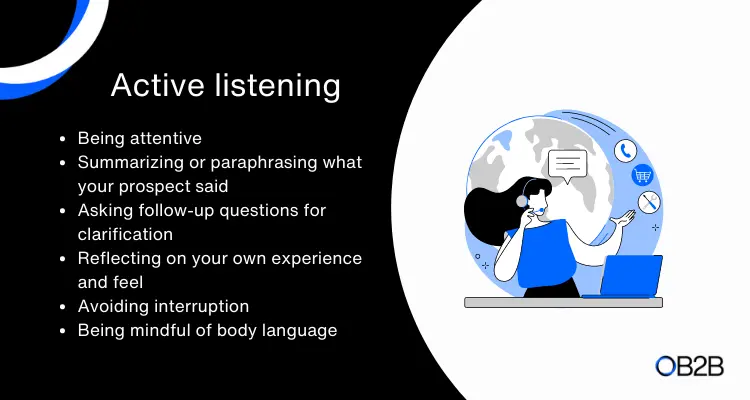
Demonstrating expertise and cultural similarity
Active listening is used to build trust between prospects and salesmen, but in B2B sales, it is also important to demonstrate expertise. After all, in B2B Telemarketing, prospects are professionals in specific fields and B2B companies’ products are aiming to resolve their specific issues.
Therefore, it is important for business development representatives to be knowledgeable of the field their prospects are working in. Of course, nobody is asking for them to be experts – but they have to present themselves as the authority on what they are selling, and they are selling something that their prospects, industry experts, are looking for.
Moreover, business development representatives working in B2B must showcase their cultural similarity to their prospects. One of the best tips for sales outsourcing is to hire local telemarketing agencies that will feel familiar to the prospects. Although call center prices are more affordable in countries like India, it takes cultural similarity to establish trustful relationships and ensure a sale.
Creating an emotional relationship
B2B sales may depend on emotions less than B2C since they have to be approved by multiple people inside a buying company. However, this does not mean that emotions don’t matter. B2B Telemarketing is about making contact with actual people and professionals inside companies that will buy certain products. Those professionals are still only people, and they also make decisions based on emotions.
This does not mean that B2B Telemarketing relies on tricks and mind games. However, successful B2B Telemarketers want their prospects to realize in what ways does their current situation afflicts them personally, and how it can be changed. For example, an accountant may not even realize how frustrated he is by his current software, and how much time he would save if he had a better fitting one.
In that sense, B2B telemarketing relies on creating emotional relationships to actually assist professionals. Since it is very important to keep your good reputation in B2B, business development representatives are not trying to make a sale at all costs – knowing it would hurt their company’s brand.
